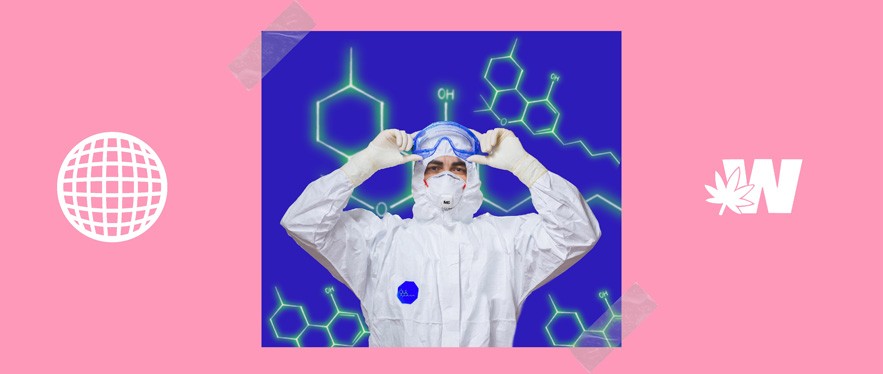
What Is HHC
Hexahydrocannabinol (HHC) stands at the forefront of the ever-expanding world of cannabinoids, captivating the attention of researchers, enthusiasts, and the curious alike. This compound, found in the cannabis plant, carries unique properties that set it apart from its more famous counterparts, such as delta-9 THC and CBD. In this comprehensive exploration, we delve into the intricate world of HHC, unraveling its molecular mysteries, exploring its potential benefits, and shedding light on its legal status and potential risks.
This post is intended as information and for general knowledge only. It is not a substitute for medical advice, diagnosis, or treatment. It is recommended that you talk to a healthcare professional about this before introducing cannabinoids into your daily routine (especially if you have been diagnosed with any medical conditions or are under any medication). It is not recommended to drive or operate any machinery when using cannabis- or hemp-derived products. Use responsibly!
What is HHC?
At its core, HHC is a chemical compound boasting a distinct molecular structure. Comprising a hydrogen atom, this compound offers a nuanced contrast to the more commonly known cannabinoids like delta-9 THC and CBD. Historically, HHC’s discovery adds an intriguing chapter to the scientific understanding of the cannabis plant. It exists alongside an array of cannabinoids, each with its own unique chemical makeup and effects.
Comparatively, HHC shares similarities with its cannabis counterparts but exhibits differences in its psychoactive effects. Unlike delta-9 THC, HHC is believed to provide a milder psychoactive experience, offering users an alternative option within the cannabinoid spectrum.
How is HHC Produced?
HHC is not only a naturally occurring compound in certain cannabis strains but can also be synthesized in laboratories. Some cannabis varieties, colloquially referred to as “HHC-rich,” contain elevated levels of this compound. The maturity of the cannabis plant influences the concentration of HHC, with higher levels often found in more mature plants.
Synthetically, advancements in laboratory techniques have enabled the production of HHC. This method allows for precise control over the compound’s purity, raising intriguing possibilities for pharmaceutical applications. Extraction from cannabis plants using various techniques is another avenue, with methods like supercritical CO2 extraction contributing to the creation of HHC products, such as vape cartridges and oils.
Pharmacology of HHC
HHC’s interaction with the endocannabinoid system distinguishes it within the cannabinoid family. It binds to both CB1 and CB2 receptors, influencing the body’s regulatory mechanisms. Research suggests that HHC might offer therapeutic effects, presenting an exciting prospect for medical applications. Unlike some cannabinoids, HHC exhibits a nuanced psychoactivity, potentially providing users with a unique and tolerable experience.
Medical and Therapeutic Applications
Recent studies have begun to shed light on the potential medical benefits of HHC. Its role in addressing specific health conditions is an ongoing area of exploration, with potential applications in pain management, anxiety, and other ailments. The comparison with other cannabinoids, such as CBD and THC, reveals a diverse landscape of potential therapeutic combinations.
As research unfolds, HHC’s potential role in treating specific conditions becomes clearer, although limitations and the need for further investigation persist. The evolving landscape of medical cannabis positions HHC as a candidate for innovative treatment modalities.

Legal Status of HHC
Navigating the legal terrain of HHC reveals a complex and varied landscape. Globally, jurisdictions grapple with defining the legal status of this compound, leading to discrepancies in regulations. Recent developments in legalization efforts, both for medicinal and recreational purposes, continue to shape the accessibility of HHC products.
Understanding the legal nuances surrounding HHC is crucial for consumers, businesses, and policymakers alike. The implications of legal status extend beyond individual use to broader considerations for the cannabis industry.
Potential Risks and Side Effects
While HHC offers potential therapeutic benefits, it is not without its risks. Reports suggest some side effects associated with HHC consumption, though these may differ from the more well-known side effects of THC or CBD. An in-depth comparative analysis of side effect profiles sheds light on the safety considerations for individuals using HHC, especially in conjunction with other medications.
The long-term effects of HHC use raise questions that warrant further investigation. As with any substance, understanding potential health implications is crucial for responsible consumption.
Research and Future Developments
Ongoing research initiatives contribute to our evolving understanding of HHC. Recent studies and clinical trials provide a snapshot of the current state of knowledge, indicating both the promise and the gaps in our understanding. Breakthroughs in HHC research, alongside emerging trends, hint at a dynamic future for this cannabinoid.
Looking ahead, the potential integration of HHC into various industries, including medicine and wellness, offers a glimpse into the transformative power of cannabinoids. Challenges notwithstanding, the trajectory suggests a future where HHC plays a pivotal role in shaping the cannabis landscape.
Conclusion
In conclusion, our exploration of HHC highlights its multifaceted nature within the world of cannabinoids. As we unravel its molecular structure, therapeutic potential, legal considerations, and risks, it becomes evident that HHC is a cannabinoid with a distinctive place in the cannabis conversation. Advocating for continued research and exploration, this journey into the world of HHC encourages a nuanced understanding of cannabinoids and their impact on health and well-being. In this ever-evolving landscape, HHC stands as a testament to the boundless possibilities that the cannabis plant continues to unfold.
















